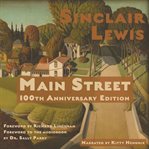Fiction
eAudiobook
Details
PUBLISHED
Made available through hoopla
EDITION
DESCRIPTION
1 online resource (1 audio file (19hr., 15 min.)) : digital
ISBN/ISSN
LANGUAGE
NOTES
Read by Kitty Hendrix
This 100th Anniversary Edition, with new Foreword by biographer Richard Lingeman and a new Afterword to the Audiobook by Dr. Sally Parry. Published in 1920, Main Street was Sinclair Lewis's first big hit. Biographer Mark Schorer wrote: it "was the most sensational event in 20th-century American publishing history, from the point of view both of sales and of public response. The printers could not keep up with the orders, and for a while the publishers had to ration out copies to book-sellers." Lewis's biting satire countered the American myth of wholesome small-town life with a depiction of narrow-minded provincialism with struck a chord - or hit a nerve - with Americans. Based on Lewis's own experiences growing on Sauk Centre, Minnesota and set in the mid-1910s, it follows Carol Kennicott, who leaves her librarian job and St. Paul, Minnesota to marry Dr. Will Kennicott of Gopher Prairie. Young and optimistic, Carol is dismayed by the town's drabness and finds the inhabitants conforming and petty. Carol sets out to improve the town, but is met with distrust and derision, and finds herself becoming a pariah. Sinclair Lewis was in the vanguard of a generation of American writers like Ernest Hemingway. F. Scott Fitzgerald, Willa Cather, Theodore Dreiser who sought more realism in their work. Lewis's intimate knowledge of small-town America and his gift for creating realistic characters make Main Street a compelling classic still surprisingly relevant today. The racism, religious bigotry, puritanical righteousness, and duplicitous business practices Lewis exposed are with us still. Unlike many of his contemporaries, Lewis's portrayal of women is surprisingly sensitive. His nuanced descriptions of marriage, and the compromises woman were expected to make, offer both insightful social commentary and convincing realism. And while he is critical of small town hypocrisies, he also finds a level of human connectedness in them lacking in big cities
Mode of access: World Wide Web







